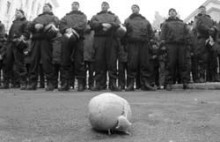Ukraine has celebrated one anniversary of the Maidan as an official holiday. True, even last year it had a bitter taste due to the rift between former allies (who turned out merely situational).
Honestly, I find it hard to imagine how they will celebrate the second anniversary. Any event on a mass scale would play out of tune, especially with politicians in the foreground, considering that it was because of them that we lost probably the best chance in our history.
However, people ought to walk out on Khreshchatyk on the date, even if to show today’s victors that we, the victors of 2004, are still there and that we do not regret the choice we made two years ago. Also, to remind ourselves of what Maidan was to each of us at the time.
On Nov. 21 [2004] after the polling stations closed, I was on the 1st Polish Channel broadcasting live from the Maidan, together with Marek Siwiec, Jerzy Buzok , and Prof. Bohdan Osadchuk.
Frankly speaking, I did not believe in our victory. I knew only too well what forces were concentrated on the other side of the barricade, but I had what turned out a poor idea about the potential we had on our side. The next morning I went to the Maidan simply to prove to myself and the world that we were not giving up struggle.
Yet by the evening, when instead of several dozen thousand I had expected I saw several hundred thousand on the Maidan, with the numbers constantly increasing, my mood started to improve. When activists from a district center appeared at the party headquarters on Tuesday after blocking a railroad with their own old Zhiguli cars, stopping a trainload of coal miners recruited in the east, without receiving any instructions (that day our leaders were still too confused), I realized that defeating these people would be difficult.
Noted Western analysts are still debating whether the Orange revolution was a revolution per se or simply a spectacular phase in the unfinished Ukrainian revolution of 1991.
This question makes no sense to me because what really matters is the essence, not a formal definition. The Orange revolution did more than rediscover Ukraine for the world that had forgotten all about it.
Most importantly, this revolution discovered the Ukraine for ourselves. We turned out capable of fighting for our rights, of making sacrifices, and even of showing mercy to the defeated enemy.
The only bad luck the proved fatal was our political elite. It is capable of mobilizing its energy and rising to the occasion, but then it slumps back into narcissism, shortsightedness, incompetence, egotism, greed, and corruption.
After the victory of the revolution I realized that the expectations were so high that even the most ideal, professional, and virtuous team would soon cause disillusionment.
After all, assignments to posts in Feb. 2005 did not necessarily have to be so bad. A team could be shaped up that would at least have similar views on the economy.
Of course, it is a shame that Yushchenko did not become a model social standard; that Tymoshenko as prime minister became an idol for that granny Paraska but failed to be an effective manager.
Yet I would rather discuss the actual treacherous behavior of egotistic European elites. They would not have taken any risks by sending a positive signal to Ukraine at the beginning of 2005, for this would be binding on no one and the negotiating process with the EU would stretch for more than a decade anyway. But no such signal was sent.
All told, the past two years have made us less romantic and more realistic. We have paid a dear price for this; according to sociologists, Ukrainians are viewing their future with greater pessimism than before the 2004 election campaign.
After experiencing bitter disappointments these ordinary Ukrainians were prepared to give the new “professional government” a big credit of confidence. True, the domination of Donetsk people in all administrative institutions, the “manual” redistribution of VAT refunds for the benefit of a certain region (it takes only one guess to name it), along with difficulties in starting the heating season and the expected shock from increasing prices and tariffs can exhaust this credit much faster than Yushchenko and Tymoshenko’s ratings faded away after being dampened in early 2005.
The question is, When and under what conditions people can again walk out in the streets?
As a publicly active individual, I am prepared to express my stand now, the way I did out in the street, in the late 1980s and during the Ukraine without Kuchma campaign. What makes the Maidan special is that we were all of us together on it.
What can cause a new Maidan and when remains an open question. One thing is obvious to me: it is impossible today. The burden of disillusionment is too heavy, yesterday’s idols have been discredited too much, and no new ones have appeared.
I think that the president was right to act the way he did on the critical days in July-August this year. He wanted a way out of an extremely complicated situation with minimum losses (although he was also largely responsible for that situation), compared to those urging people out on streets and squares, calling for new elections. At the time the democratic pro-European forces had no potential for winning the new elections.
However, this does not mean that preconditions for the victory of those campaigning for a just and European Ukraine will not appear in one, two or five years. It is important for the new generation of leaders to be in the foreground, free from the burden of mistakes, failures, and responsibility for passing up the excellent opportunities the Maidan offered Ukraine in Nov.-Dec. 2004.







